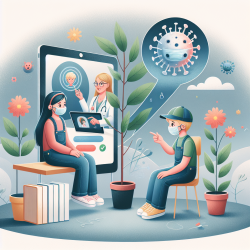The COVID-19 pandemic brought unprecedented challenges, particularly for children with neurodevelopmental disabilities (NDD) and their families. The research article "Impacts of the COVID-19 Pandemic: Pan-Canadian Perspectives From Parents and Caregivers of Youth With Neurodevelopmental Disabilities" provides valuable insights that can help practitioners improve their skills and outcomes in online therapy. This blog explores the key findings and suggests actionable steps for speech-language pathologists (SLPs) to enhance their practice.
Key Findings from the Research
The study highlighted several areas where service disruptions significantly impacted families and children with NDD:
- Health Services: Delays in accessing medical services and cancellations of therapeutic services led to developmental and social regression in children.
- Education: The transition to online learning lacked the resources and support necessary for children with NDD, affecting their academic development.
- Employment: Parents faced increased caregiving responsibilities, resulting in job losses or reduced work hours.
- Risk Mitigation: Public health measures often did not consider the unique needs of children with NDD, causing additional stress and isolation.
Actionable Steps for Practitioners
Based on these findings, here are some recommendations for SLPs to improve their online therapy outcomes:
- Personalized Therapy Plans: Develop individualized therapy plans that consider the unique needs and challenges of each child. Use data-driven assessments to tailor interventions.
- Parental Involvement: Engage parents in the therapy process. Provide them with resources and training to support their child's development at home.
- Virtual Engagement: Utilize interactive and engaging online tools to maintain the child's interest and participation during virtual sessions.
- Regular Monitoring: Continuously monitor the child's progress and adjust therapy plans as needed. Use data analytics to track improvements and identify areas for further intervention.
- Collaboration with Educators: Work closely with educators to ensure that therapy goals align with educational objectives. Share progress reports and collaborate on strategies to support the child's overall development.
Encouraging Further Research
While the study provides valuable insights, further research is needed to explore long-term impacts and effective interventions. Practitioners are encouraged to contribute to research efforts by documenting their experiences and outcomes. Collaboration with academic institutions can also help generate more comprehensive data.
To read the original research paper, please follow this link: Impacts of the COVID-19 Pandemic: Pan-Canadian Perspectives From Parents and Caregivers of Youth With Neurodevelopmental Disabilities.










